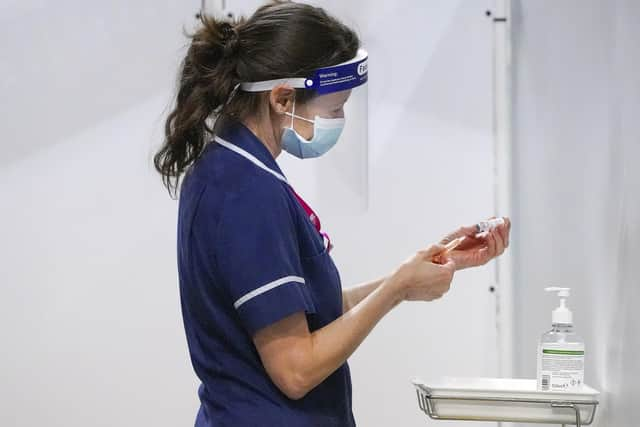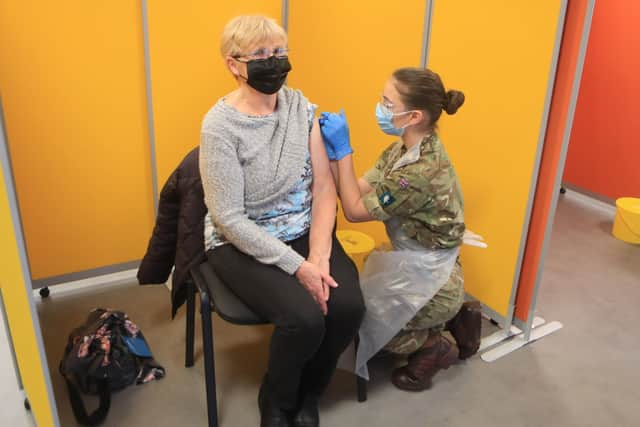Tackling online misinformation about the Covid vaccine programme
“We’ve all become amateur scientists as Covid has gone on,” says Carmel O’Toole.
The senior lecturer in media and public relations at Sheffield Hallam University is giving her thoughts on the vast amount of complex detail the public has needed to assimilate since the coronavirus pandemic began, and while it’s true that society has become easily conversant in terms previously only used by medics and epidemiologists – ‘self-isolation’, ‘herd immunity’ for example – the roll-out of the vaccine programme has inspired a worrying trend.
Advertisement
Hide AdAdvertisement
Hide AdIn December a study by King’s College London found that one in three people in the UK had been exposed to messages discouraging them from getting a coronavirus jab, with a ‘notable minority’ believing conspiracy theories about Covid-19 vaccines.


These myths range from the notion the vaccine will cause infertility or that it alters DNA, to the idea that the purpose of the inoculation scheme is to implant microchips into humans – social media users and younger people are particularly inclined to think such claims are true, the researchers discovered.
Against this backdrop, O’Toole says, it is ever more important for the public to have access to ‘good, solid factual information’.
“I think there’s a combination of things happening,” she says. “There are some pressure groups that are opposed to the vaccination for whatever reason who are spreading misinformation which is deliberately misleading, to genuine concerns from people, and I think it’s important to make the distinction between that.”
Advertisement
Hide AdAdvertisement
Hide AdSome Muslims are anxious about the vaccines’ halal status, while black and minority ethnic communities have fears ‘going back generations which link to things like unethical experiments as recently as the 1960s’, O’Toole says, adding: “We do need to be reassured.”


Dr Andrew Lee, a consultant for Public Health England who is also a reader of global public health at Sheffield University, says the vaccines’ effectiveness has been firmly established.
“We’ve got three jabs now, they’ve gone through the safety trials,” he says. “We also know from reports coming from the US that the rate of side-effects is very low.
“One of the myths was about it affecting fertility – none of the trials have shown that; the Royal College of Obstetricians and Gynaecologists was categorical in their reassurance that there was no link.
Advertisement
Hide AdAdvertisement
Hide Ad“The imams have been consulted, there are no pork products in it.


“There shouldn’t be any concerns of faith groups from that point of view. And I can most certainly reassure people that there are no microchips in the vaccine. That’s a complete hoax.”
He agrees the vaccines have emerged remarkably quickly.
“I can see why people might think ‘Gosh, how have they accelerated it?’.” He attributes this speediness to the methods adopted by the UK’s Medicines and Healthcare Products Regulatory Agency, responsible for approving injections for use.
“They are very robust. The MHRA was receiving information from the vaccine trials all through the summer last year up to the point of decision-making. It just allowed them to see the data as it emerged much quicker. There have been no shortcuts.”
Advertisement
Hide AdAdvertisement
Hide AdO’Toole says the duty for providing factual guidance lies with the Government and bodies like the World Health Organisation. “Crucial to that is public trust in what these agencies are doing,” she says. “That’s one of the things I have real concerns about with the UK Government. I’m not sure the public trust is there as it should be for all sorts of reasons.”
The ‘obvious turning point’ that ‘damaged the trust in government communications’, she says, was the notorious trip from London to Durham, and then to Barnard Castle, made by Boris Johnson’s former chief adviser Dominic Cummings during the first national lockdown last year.
“There was a moment when people saw something happening which suggested it’s one rule for the Government and their friends and one for the rest of the population. That really isn’t helpful.
“A crucial thing in crisis communications is that people believe what they’re told by authoritative agencies.”
Advertisement
Hide AdAdvertisement
Hide AdPublic confidence in the Government’s ability to handle the pandemic dropped sharply when the news emerged about Cummings, according to analysis by University College London researchers published in The Lancet last August.
The UCL’s Covid-19 Social Study was launched in the week before lockdown began in March 2020; respondents were asked how much confidence they had in the Government’s handling of the epidemic from one – not at all – to seven, meaning ‘lots’.
Their answers, the study said, indicated a ‘clear decrease in confidence’ starting on May 22, when the Cummings story initially broke, that continued to ‘fall quickly in the days following’.
“The stakes are so much more important when it’s about keeping people safe and getting them to sign up to a vaccination programme which is our route out of lockdown and the regime we’ve had to suffer for so long,” says O’Toole, who has noticed ‘a palpable change of tone’ since Cummings’ departure in November.
Advertisement
Hide AdAdvertisement
Hide Ad